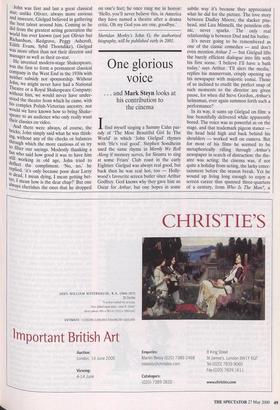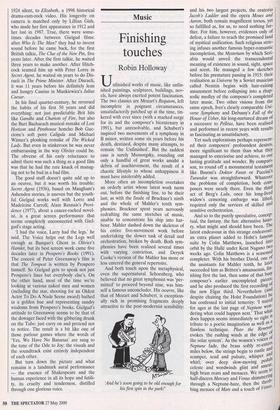One glorious voice
Ifind myself singing a Sammy Cahn par- ody of 'The Most Beautiful Girl In The World' in which 'John Gielgud' rhymes with 'He's real good'. Stephen Sondheim used the same rhyme in Merrily We Roll Along if memory serves, for Sinatra to sing at some Friars' Club roast in the early Eighties: Gielgud was always real good, but back then he was real hot, too — Holly- wood's favourite screen butler since Arthur Godfrey. God knows why they gave him an Oscar for Arthur, but one hopes in some subtle way it's because they appreciated what he did for the picture. The love story between Dudley Moore, the slacker piss- head, and Liza Minnelli, the penniless eth- nic, never sparks. The only real relationship is between Dud and his butler.
It's never going to be remembered as one of the classic comedies — and don't even mention Arthur 2 — but Gielgud lifts the barely efficient dialogue into life with his first scene. 'I believe I'll have a bath today,' says Arthur. 'I'll alert the media,' replies his manservant, crisply opening up his newspaper with majestic ennui. Those of us inclined to credit the perfect snap of such moments to the director are given pause, for when did Steve Gordon, Arthur's helmsman, ever again summon forth such a performance?
In its way, it sums up Gielgud on film: a line beautifully delivered while apparently bored. The voice was as powerful as on the stage, and that trademark pigeon stance the head held high and back behind his shoulders — worked well on camera. But for most of his films he seemed to be metaphorically rifling through Arthur's newspaper in search of distraction: the the- atre was acting; the cinema was, if not quite a holiday from acting, the larky enter- tainment before the season break. Yet he wound up living long enough to enjoy a screen career that spanned three-quarters of a century, from Who Is The Man?, a 1924 silent, to Elizabeth, a 1998 historical drama-cum-rock video. His longevity on camera is matched only by Lillian Gish, who made her first appearance in 1912 and her last in 1987. True, there were some- times decades between Gielgud films: after Who Is The Man? they had to invent sound before he came back, for the first British talkie, The Clue of the New Pin, five years later. After the first talkie, he waited three years to make another. After Hitch- cock teamed him up with Peter Lorre in Secret Agent, he waited six years to do Dis- raeli in The Prime Minister. After Disraeli, it was 11 years before his definitely lean and hungry Cassius in Mankiewicz's Julius Caesar.
In his final quarter-century, he reversed the habits of his first 50 years and did everything: not just predictable Brit hits like Gandhi and Chariots of Fire, but also the Burt Bacharach musical remake of Lost Horizon and Penthouse honcho Bob Guc- cione's soft porn Caligula and Michael Winner's plonking remake of The Wicked Lady. But even in stinkeroos he was never embarrassing in the way Olivier could be. The obverse of his early reluctance to admit there was such a thing as a good film was that he had the rare knack of manag- ing not to be bad in a bad film The good stuff doesn't quite add up to an oeuvre, but it was worth his trouble: Secret Agent (1936), based on Maugham's Ashenden stories, is uneven but the youth- ful Gielgud works well with Lorre and Madeleine Carroll; Alain Resnais's Provi- dence (1977), about a cancer-racked novel- ist, is a great screen performance that seems completely unconnected with Giel- gud's stage acting.
`I had the voice, Larry had the legs,' he said. The Voice helps out the Legs well enough as Banquo's Ghost in Olivier's Hamlet, but its best screen work came five decades later in Prospero's Books (1991). The conceit of Peter Greenaway's film is that The Tempest is written by Prospero himself. So Gielgud gets to speak not just Prospero's lines but everybody else's. On the other hand, most of the time we're looking at various naked men and women (including the star, shooting for an Oldest Actor To Do A Nude Scene award) bathed in a golden hue and representing sundry wisdoms from Prospero's books. Gielgud's attitude to Greenaway seems to be that of the dowager faced with the gibbering drunk on the Tube: just carry on and pretend not to notice. The result is a bit like one of those parlour games where the words of `Yes, We Have No Bananas' are sung to the tune of the Ode to Joy: the visuals and the soundtrack exist entirely independent of each other.
But turn down the picture and what remains is a landmark aural performance — the essence of Shakespeare and the human experience in all its hope and futili- ty, its cruelty and tenderness, distilled through one glorious voice.



































































 Previous page
Previous page